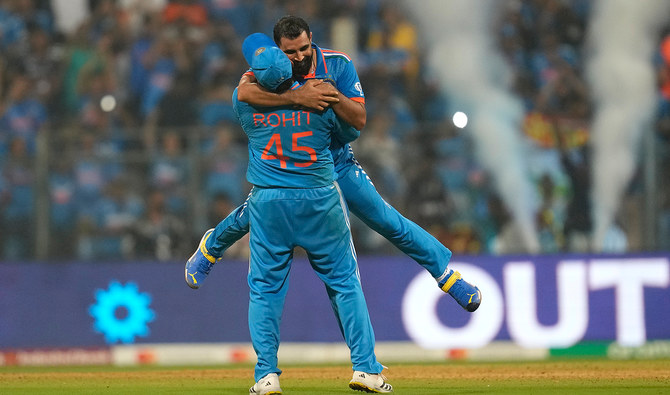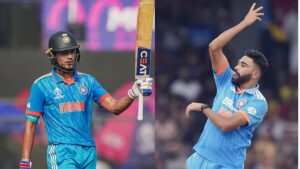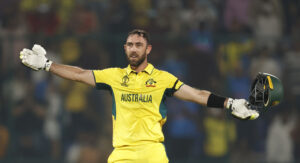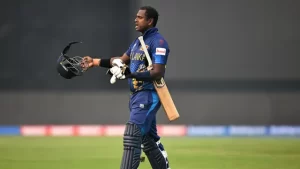Journey Of Mahendra Singh Dhoni In Cricket
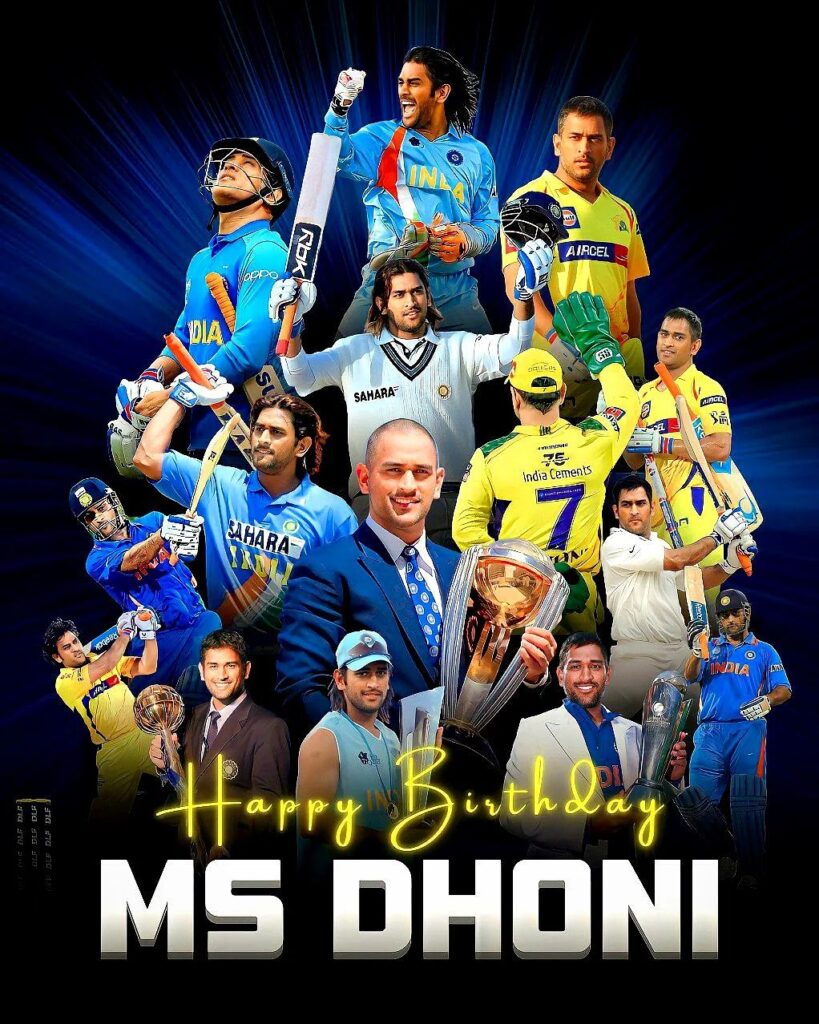
Birthday Pic Of Caption Cool Mahendra Singh Dhoni
An Indian professional cricketer, was born on 7th July 1981. He achieved remarkable success as the captain of the Indian national team in limited-overs formats from 2007 to 2017 and in Test cricket from 2008 to 2014. Dhoni, known for his right-handed wicket-keeping and batting skills, currently leads the Chennai Super Kings in the Indian Premier League.
Born in Ranchi, Bihar (now in Jharkhand), Dhoni displayed his exceptional wicket keeping skills at the Commando Cricket Club (1995–1998). His talent earned him a spot in the 1997/98 season Vinoo Mankad Trophy Under-16 Championship, where he showcased his abilities. In addition to his cricket pursuits, Dhoni worked as a Travelling Ticket Examiner at Kharagpur railway station in West Bengal from 2001 to 2003.
Dhoni’s domestic cricket career included playing for Bihar and later for the Jharkhand Cricket team. During the 2002–03 season, he gained recognition for his lower-order contributions and hard-hitting batting style, scoring three half-centuries in the Ranji Trophy and a couple more in the Deodhar Trophy.
On 23rd December 2004, Dhoni made his One Day International (ODI) debut against Bangladesh in Chittagong. A year later, he played his first Test match against Sri Lanka, followed by his first T20I against South Africa. In 2007, he took over the ODI captaincy from Rahul Dravid and also became the T20I captain of India. In 2008, he was appointed Test captain.
Dhoni’s captaincy record in Tests was mixed, leading India to a series win against New Zealand in 2008 and the Border-Gavaskar Trophy against Australia in 2010 and 2013. However, in other formats, Dhoni made history as the first cricketer to be a winning captain of all three major ICC trophies. Under his leadership, India emerged victorious in the 2007 ICC World Twenty20, the 2011 Cricket World Cup, and the 2013 ICC Champions Trophy. He also guided India to triumph in the 2010 and 2016 Asia Cup. Furthermore, Dhoni led India to secure the 2010 and 2011 ICC Test Mace and the 2013 ICC ODI Championship. His international cricket career included scoring 17,266 runs, including more than 10,000 runs in ODI Internationals.
In the Indian Premier League, Dhoni serves as the captain of the Chennai Super Kings (CSK). Under his leadership, CSK reached the final on ten occasions, winning the tournament in 2010, 2011, 2018, 2021, and 2023. They also claimed the Champions League T20 title in 2010 and 2014. Dhoni holds the distinction of being the 7th cricketer to score over 5,000 runs in the IPL and the first wicket-keeper to achieve this feat.
Dhoni has received numerous accolades for his contributions to cricket. In 2008, he was honored with India’s highest sports award, the Major Dhyan Chand Khel Ratna Award. The Government of India recognized his achievements by bestowing upon him the Padma Shri in 2009 and the Padma Bhushan in 2018. Dhoni holds an honorary rank of Lieutenant Colonel in the Parachute Regiment of the Indian Territorial Army, conferred upon him in 2011 for his service to the nation as a cricketer. Known for his immense popularity, Dhoni is considered one of the most beloved cricketers worldwide and is a prominent brand endorser in India. His life was portrayed in the 2016 film, M.S. Dhoni: The Untold Story.
Dhoni announced his retirement from Test cricket on 30th December 2014 and stepped down as the captain of T20Is and ODIs in 2017. On 15th August 2020, he retired from all formats of international cricket while continuing to participate in the IPL.
Junior Cricket in Bihar
In 1998, Dhoni’s cricket journey in Bihar began when he was chosen by Deval Sahay, a former Vice President of the Bihar Cricket Association and the President of Ranchi District Cricket, to play for the Central CoalFields Limited (CCL) team. Prior to this, Dhoni, who was in 12th grade at the time, had not played professional cricket. Playing for CCL provided him with the opportunity to bat higher up the order, where he displayed exceptional performances, helping CCL advance to the A division. Impressed by his talent, Deval Sahay advocated for Dhoni’s selection in the Bihar team.
Dhoni then transitioned to the Ranchi team, representing the junior Bihar cricket team, and swiftly progressed to the senior Bihar Ranji Team within a year. In the 1998–99 Cooch Behar Trophy, Dhoni represented the U-19 Bihar team and scored 176 runs in 5 matches across 7 innings. However, Bihar finished fourth in the group of six teams and failed to qualify for the quarter-finals. Dhoni was not chosen for the East Zone U-19 squad (CK Nayudu Trophy) or the Rest of India squad (MA Chidambaram Trophy and Vinoo Mankad Trophy) that season.
In the following 1999–2000 Cooch Behar Trophy, the Bihar U-19 cricket team made it to the finals. Dhoni’s impressive knock of 84 contributed to Bihar posting a total of 357 runs. However, Punjab’s total of 839, led by Dhoni’s future teammate Yuvraj Singh’s 358, surpassed Bihar’s efforts. Throughout the tournament, Dhoni’s contributions included 488 runs in 9 matches and 12 innings, with 5 half-centuries, 17 catches, and 7 stumpings.
Although Dhoni made it to the East Zone U-19 squad for the CK Nayudu Trophy in the 1999–2000 season, he only managed to score 97 runs in four matches. Unfortunately, East Zone lost all four matches and finished last in the tournament.
Bihar cricket team
In the 1999–2000 season, at the age of eighteen, Dhoni made his debut for the Bihar cricket team in the Ranji Trophy. In his very first match, he showcased his potential by scoring an unbeaten half-century of 68* in the second innings against the Assam cricket team. Throughout the season, Dhoni accumulated a total of 283 runs in 5 matches.
In the following 2000/01 season, Dhoni achieved a significant milestone by scoring his maiden first-class century while representing Bihar against Bengal. However, apart from this century, his performances in that season did not include any other scores exceeding fifty. In the subsequent 2001/02 season, Dhoni managed to score five fifties in four Ranji matches.
Jharkhand cricket team
During the 2002–03 season, Dhoni’s performances for the Jharkhand cricket team started to gain recognition. He displayed his hard-hitting batting style and made valuable contributions in the lower-order. In the Ranji Trophy, he scored three half-centuries, and in the Deodhar Trophy, he added a couple more half-centuries to his name.
The 2003/04 season proved to be significant for Dhoni as he notched up a century (128*) against Assam in the first match of the Ranji ODI tournament. He also represented the East Zone squad in the Deodhar Trophy and played a crucial role in their triumph in the 2003–2004 season. Dhoni contributed 244 runs in 4 matches, including a splendid century (114) against the Central Zone.
In the finals of the Duleep Trophy, Dhoni was selected ahead of established international cricketer Deep Dasgupta to represent East Zone. Despite being on the losing side, Dhoni showcased his fighting spirit by scoring a crucial half-century in the second innings.
Dhoni’s talent was discovered through the Board of Control for Cricket in India’s (BCCI) talent-spotting initiative called TRADE (Talent Resource Development Wing). It was TRDO Prakash Poddar, the former captain of Bengal in the 1960s, who first noticed Dhoni’s abilities. Poddar saw Dhoni play for Jharkhand in a match held in Jamshedpur in 2003 and sent a report about Dhoni’s potential to the National Cricket Academy.
Journey Of Indian Team
Dhoni’s impressive performances in the 2003/04 season, particularly in the Day format, earned him recognition and a place in the India A squad for a tour of Zimbabwe and Kenya. During a match against the Zimbabwe XI at Harare Sports Club, Dhoni displayed his exceptional wicket-keeping skills, recording 7 catches and 4 stumpings, marking his best performance behind the stumps.
In a tri-nation tournament involving Kenya, India A, and Pakistan A, Dhoni played a crucial role in India ‘s successful chase of 223 runs against Pakistan A, contributing with a valuable half-century. He continued to shine with the bat by scoring consecutive centuries against the same team, hitting 120 and an unbeaten 119. Dhoni finished the series with an impressive tally of 362 runs in 6 innings, maintaining an average of 72.40.
His outstanding performances in the series caught the attention of notable figures in Indian cricket, including the then-captain Sourav Ganguly and Ravi Shastri, among others, who recognized Dhoni’s talent and potential.
International career
Started Of ODI Journey
During the early 2000s, the Indian ODI team had Rahul Dravid fulfilling the role of the wicket-keeper to ensure a strong batting line-up. However, the team began exploring wicket-keeper/batsman options from the junior ranks, with talented players like Parthiv Patel and Dinesh Karthik, who had captained the India U-19 team, being named in the Test squads.
Meanwhile, Dhoni’s impressive performances for India A caught the attention of the selectors, leading to his inclusion in the ODI squad for the Bangladesh tour in the 2004/05 season. However, Dhoni’s debut in ODI cricket didn’t go as planned, as he was run out for a duck in his first match. Despite a somewhat average series against Bangladesh, Dhoni’s potential was recognized, and he was subsequently picked for the ODI series against Pakistan.
Thus, Dhoni’s international career began with a few ups and downs, but his talent and potential made it clear that he had a bright future ahead in the world of ODI cricket.
In his fifth one-day international match, Dhoni had a breakthrough performance that would leave a lasting impact. Playing in Visakhapatnam, he smashed an incredible 148 runs off just 123 deliveries, surpassing the previous record for the highest score by an Indian wicket-keeper. Little did anyone know that Dhoni would rewrite this record again before the year’s end.
During the Sri Lankan bilateral ODI series in October-November 2005, Dhoni had limited opportunities to showcase his batting skills in the first two games. However, in the third ODI at Sawai Mansingh Stadium in Jaipur, he was promoted to No. 3 in the batting order. With Sri Lanka setting India a target of 299 runs, Dhoni came to the crease after the early dismissal of Tendulkar. In a sensational display of power hitting, Dhoni remained unbeaten on 183 off just 145 balls, leading India to a remarkable victory. This innings was described by Wisden Almanack (2006) as “Uninhibited, yet anything but crude.” Dhoni’s innings set several records, including the highest individual score in ODI cricket in the second innings, a record that would stand for seven years until broken by Shane Watson. Dhoni ended the series with the highest run aggregate of 346 runs and was rightfully awarded the Man of the Series.
In the first match of 2006 against Pakistan, Dhoni contributed 68 runs to India’s total of 328. However, despite his efforts, India faltered in the later overs and lost the match due to the Duckworth-Lewis method. But in the third match of the series, Dhoni once again proved his mettle by scoring a quickfire 72 off just 46 balls, including 13 boundaries. His stellar performance helped India take a 2-1 lead in the series. Dhoni continued his brilliant form in the final match, scoring 77 runs off 56 balls, leading India to a series victory.
Dhoni’s consistent performances in ODIs earned him the top spot in the ICC ODI Rankings for batsmen on 20 April 2006, surpassing Ricky Ponting. However, his reign at the top lasted only a week as Adam Gilchrist’s performances pushed him back down.
The subsequent series against Sri Lanka and the DLF Cup in 2006-07 proved to be disappointing for India, as they failed to perform well and did not qualify for the finals. The 2006 ICC Champions Trophy also saw India facing defeats against West Indies and Australia, although Dhoni managed to score a half-century against West Indies.
The ODI series in South Africa mirrored India’s struggles, with Dhoni scoring 139 runs in four matches but unable to prevent a series loss of 4-0. Criticism of Dhoni’s wicket-keeping technique emerged, with former wicket-keeper Syed Kirmani expressing his concerns. Nevertheless, despite the challenges, Dhoni’s performances throughout the year earned him a spot in the ICC World ODI XI.
From 2007 World Cup To 2015 World Cup
The preparations for the 2007 Cricket World Cup seemed promising for India as they recorded convincing 3-1 victories over West Indies and Sri Lanka in the lead-up. Dhoni played a crucial role in these series, maintaining an average of over 100 in both.
However, the actual World Cup campaign turned out to be a massive disappointment for India. They suffered unexpected losses to Bangladesh and Sri Lanka in the group stage, resulting in an early exit from the tournament. Dhoni’s performances mirrored the team’s struggles, as he failed to make an impact, scoring just 29 runs in the entire tournament. The disappointment was further compounded when the house Dhoni was constructing in Ranchi was vandalized by political activists after India’s loss to Bangladesh.
Determined to bounce back, Dhoni responded with a remarkable innings of 91 not out against Bangladesh in a bilateral series. With India facing a challenging run-chase, Dhoni’s composed and match-winning knock earned him the Man of the Match award. He continued to shine in the subsequent Afro-Asia Cup, amassing 174 runs in three matches at an average of 87.00. His blistering unbeaten knock of 139 off 97 balls in the third ODI earned him another Man of the Match accolade.
Dhoni’s consistent performances earned him the position of vice-captain in the ODI team for the series against South Africa in Ireland and the subsequent India-England seven-match ODI series. In recognition of his contributions, Dhoni was upgraded to an ‘A’ grade contract by the BCCI in June 2007.
Furthermore, Dhoni’s leadership skills and potential were acknowledged when he was appointed as the captain of the Indian squad for the inaugural ICC World Twenty20 in September 2007. This decision came after senior players like Rahul Dravid, Sourav Ganguly, Sachin Tendulkar, and Anil Kumble declined to participate in the T20 format. Under Dhoni’s captaincy, India achieved a historic victory in the tournament by defeating Pakistan in the final, securing their first solo ICC trophy since 1983. This triumph marked Dhoni as a future captain of the Indian cricket team across all formats.
On 2 September 2007, Dhoni equaled his idol Adam Gilchrist’s international record for the most dismissals in an innings in ODIs, taking five catches and effecting one stumping against England.
The rise through the ranks continued for Dhoni. During the series against Australia in 2009, he played crucial innings, including a remarkable 124 runs off 107 balls in the second ODI and 71 runs off 95 balls in the third ODI, helping India secure victory. In the same year, Dhoni had an exceptional ODI season, scoring 1198 runs in just 24 innings at an average of 70.43. For his outstanding performances, he was named the captain and wicketkeeper of the World ODI XI by the ICC.
Following the 2011 World Cup, Dhoni continued to lead the team with distinction. He captained India to victory in the 2013 ICC Champions Trophy, becoming the first and only captain to claim all ICC trophies. His tactical acumen and leadership skills played a significant role in India’s success. Despite being out for a duck in the final, his field placements and strategic decisions helped India secure a five-run win against England (D/L method).
Dhoni’s heroics were not limited to the ICC events. Despite getting injured in the tri-nation tournament against West Indies and Sri Lanka, he returned to play the final against Sri Lanka and guided India to a thrilling victory by one wicket, remaining unbeaten on 45 off 52 balls. In November 2013, Dhoni became the second Indian batsman, after Sachin Tendulkar, to aggregate 1,000 or more ODI runs against Australia.
India’s subsequent tours to South Africa and New Zealand proved challenging, with India losing both series. However, Dhoni made notable contributions, including a match-saving 50 against New Zealand that helped India avoid a series whitewash. He also reached the milestone of scoring 8,000 runs in ODI cricket during the tour.
Dhoni’s leadership and batting prowess continued to shine as India won ODI series against England and West Indies in 2014. In the series against England, Dhoni played crucial innings, including a century in a losing cause.
The 2015 World Cup brought mixed fortunes for Dhoni and India. While the team performed exceptionally well in the group stage, winning all their matches, they faltered against Australia in the semi-finals. Dhoni, however, displayed his batting prowess throughout the tournament, scoring 237 runs in six innings with an average of 59.25 and a strike rate of 102.15. His captaincy milestones included winning 100 ODI matches, becoming the third captain overall and the first non-Australian to achieve this feat.
Despite the disappointment in the semi-finals, Dhoni’s consistent performances in the 2015 World Cup showcased his leadership and batting abilities, making him one of the standout performers of the tournament.


